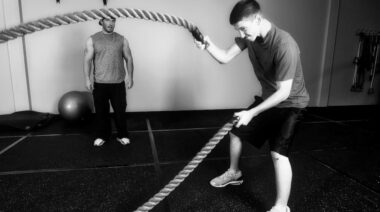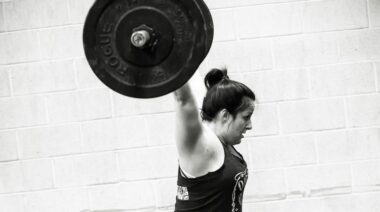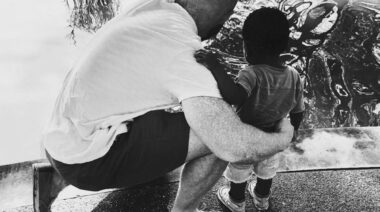I often ride a razor’s edge as the parent of two young athletes. The blade sharpens when trying to figure out when to push them, or not push them; be involved, but not too much. A situation becomes complicated when you realize they are good at something. It can get hairy when you realize they may be great.
My oldest daughter Maya, now sixteen, was once a second degree black belt in Taekwondo being primed for the national team by her world-class coach from Brazil. “Olympics some day, Maya!” he yelled during especially grueling workouts. She was 12 then, and this was the age when competition separated girls with natural athletic ability from athletes with life-changing potential. I monitored her closely during the elite training. Was this fun? Is this what she wanted? At the time, it was.
Kicks to the head in Taekwondo matches are legal at age twelve. On a couple occasions, I watched my girl receive kicks to the helmet that brought her to her knees. Time slowed for me in those moments as I watched from the stands. My baby was down. Long braids skimmed the mat as she chewed on her black mouth guard. Hot tears pooled, but didn’t fall. Then she was up, tugging hard on her uniform. After adjusting her helmet, she assumed fighting stance again.
I always fought back tears myself when I watched her fight. How brave she was. She was creating a resolve and fearlessness inside the ring that easily spilled outside of it. These were big-picture moments I could not have taught her better myself. And if Maya loved Taekwondo, then I loved it, and I watched all her matches with enormous pride, at the edge of my seat, and sometimes through the fingers that covered my face.
My instinct is to protect my girls, but deep down I know, especially as an athlete myself, that despite the risk of injury they learn amazing things about themselves on the court or on the mat; things that will last a lifetime.
After a disappointing showing at the Junior Olympics, I watched Maya get trained harder by her coach. I watched her wear down mentally. I constantly wondered when I should push her natural talent and when I should lay off to let her enjoy all aspects of childhood. If the overall joy leaves, then what’s the point? Would she end up hating all training and any sport?
By thirteen she was done with Taekwondo. She was burnt out and all she wanted to do was play basketball. She craved a team sport. Despite the shock and pleas from her coach, that’s what I let her do. We talked about it from all angles. It was beyond a matter of persevering. The light had simply gone out. And this is when you have to know your child’s personality. I realized her drive had been exhausted and she no longer enjoyed the pressure.
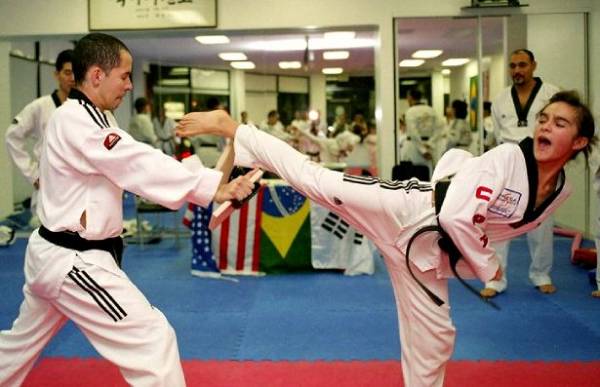 This year Maya is on a varsity basketball team that is in the midst of CIF post-season play. She is, not surprisingly, an aggressive two guard who plays like a power forward with the height of a small point guard. She’s good and I love to watch her play. She was more gifted at Taekwondo, honestly, but basketball brings her more joy.
This year Maya is on a varsity basketball team that is in the midst of CIF post-season play. She is, not surprisingly, an aggressive two guard who plays like a power forward with the height of a small point guard. She’s good and I love to watch her play. She was more gifted at Taekwondo, honestly, but basketball brings her more joy.
Ultimately, I’m here to help her examine her decisions thoughtfully, and then support them. Coercing her too much toward my own opinions doesn’t teach her how to be an independent and strong person who can function at her best on her own. Her coach can be single-minded about a task; to groom a top-performing athlete. But as a parent, my job is to guide her through every facet of life on the foundation of good character, and teach her that life should be fun even when working hard.
Though my kids learn many lessons during competition, as a parent I still need to navigate them through tricky territory that comes with being an athlete. Competition is not for the faint of heart and a child warrior still needs the loving touch and guidance of an astute parent.
Here’s a list of what I tell my girls constantly and what I have to remind myself too:
- It’s ok to lose. Losing is hard, but it’s part of competition especially as they are improving in their sport. If they don’t know how to lose well it makes it harder for them to get better, or claw their way back, or even shift to something else without fear of failing. I always let my girls mourn a loss, but the most important questions I can ask them are, “What will you do with the loss? Will it crush you? Will it make you stronger?”
- Giving 100% is what’s up. Did they give their all in training? Did they give their all in a game? That’s always what I praise most, win or lose.
- Sometimes it’s hard. Being an athlete should be fun the majority of the time, but sometimes it’s not. That’s ok. The times they have to put their head down and tough it out either in a game or in a training session is what defines character as an athlete, and as a person. When they realize they’ll be ok, even when it’s hard, is when they become better.
- Be a good winner. A sore loser is bad, but a sore winner is not much different. In the end, character trumps a scorecard.
- Let their coach do the coaching. I will always be their first coach, but after they reach a certain level, my advice and technical pointers might only serve as a distraction. I try to stick to emotional support and life-lesson speeches.
- Know their personalities. Not every kid wants to practice for hours on end or is spurred on by the thrill of competition. Is this our dream or theirs? Maya is not a win-at-all costs competitor and eventually the pressure of a solo sport was not what she enjoyed. Staying in tune with her personality helped her find a sport that gives her more joy, and she’ll enjoy it longer.
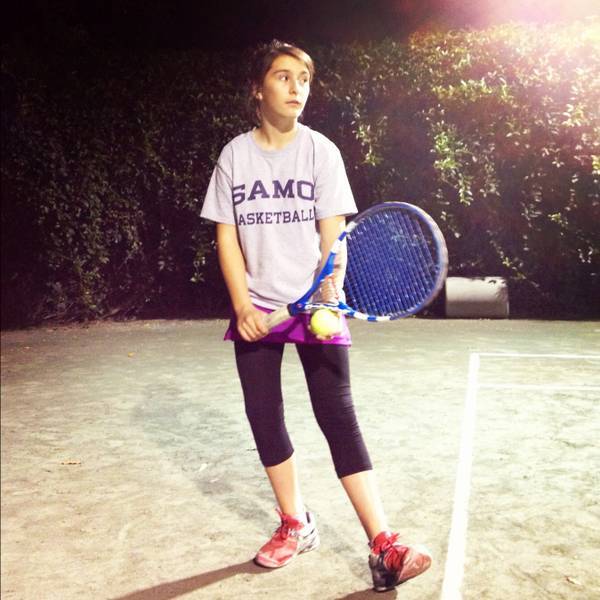 Just because one child has one type of personality, does not mean the next will have the same. My younger daughter, Mina, ironically asked to not play basketball so she could play tennis, a solo sport. She wanted wins and losses to fall on her shoulders only. She’s twelve now and her tennis game is impressive. We push her, probably more than we did Maya, and she responds well to it. Losses don’t faze her, pressure doesn’t faze her, and she loves a good performance almost more than a win. I have to pull her back from being too cocky sometimes. I scratch my head at the differences between my girls, but I know I have to give Mina the guidance that is unique only to her to keep her motivated, progressing and loving the sport she’s in.
Just because one child has one type of personality, does not mean the next will have the same. My younger daughter, Mina, ironically asked to not play basketball so she could play tennis, a solo sport. She wanted wins and losses to fall on her shoulders only. She’s twelve now and her tennis game is impressive. We push her, probably more than we did Maya, and she responds well to it. Losses don’t faze her, pressure doesn’t faze her, and she loves a good performance almost more than a win. I have to pull her back from being too cocky sometimes. I scratch my head at the differences between my girls, but I know I have to give Mina the guidance that is unique only to her to keep her motivated, progressing and loving the sport she’s in.
But with either child, I always ride the razor’s edge hoping that I’m doing it right.

